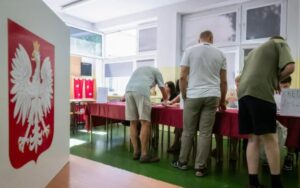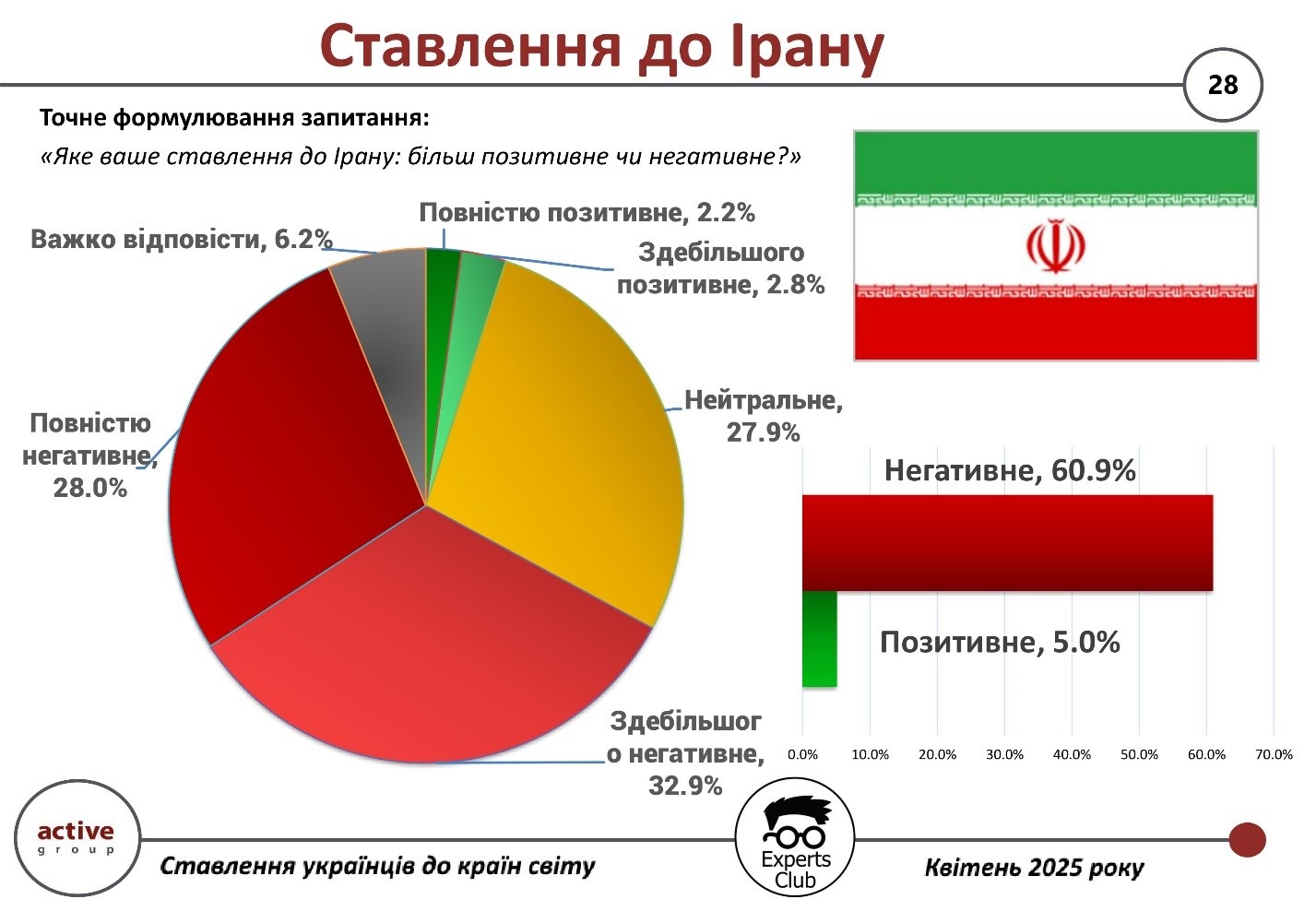
Ukrainian citizens demonstrate the highest level of sympathy toward Canada, Great Britain, Sweden, Denmark, and the Netherlands. These are the results of a study conducted by Active Group in collaboration with the Experts Club think tank and the SunFlower Sociology platform in April 2025. Canada came out on top in terms of positive image: 40.6% of Ukrainians expressed a completely positive attitude, with another 35.7% expressing a mostly positive attitude. The overall positive balance was a record 73.5%.

The United Kingdom ranks second with a total positive rating of 68.6%. Sweden, Denmark, and the Netherlands are also at the top of the ranking with similarly high levels of positive perception — over 68% of the total positive rating.
France and Germany remain strong, but their positions are less clear-cut. In France, the share of “mostly positive” attitudes is particularly high at 47.7%, although only 26.4% view it as “completely positive.” In Germany, 23.7% of respondents indicated a completely positive attitude, but the level of distrust has increased, with 7.9% of Ukrainians assessing it negatively.
The US elicited a mixed reaction: only 6.7% of Ukrainians rated this country completely positively, while 26.5% expressed a negative attitude. The image balance in the US is one of the lowest among Western partners — only 5.3%. Ukrainians showed a similar level of disappointment with Central European countries: Hungary has the worst image of all, with only 4.1% of completely positive responses and as many as 47.7% negative, giving a net image balance of -43.6%. Slovakia also has a negative rating of -14.8%.
“These results are not only a reflection of public opinion, but also a benchmark for diplomatic activity. Countries with high levels of support have the best conditions for strengthening bilateral ties with Ukraine in the humanitarian, security, and economic spheres,” comments Maxim Urakin, PhD in Economics and founder of Experts Club.
Overall, the survey results clearly demonstrate that international support for Ukraine in difficult times directly shapes citizens’ trust. Ukrainians’ attitudes are not only based on historical or cultural ties, but also depend to a large extent on the specific actions of foreign states during the war.

In April, Active Group, in collaboration with Experts Club, conducted an online survey of 800 Ukrainians regarding their attitudes toward various countries. The goal was to determine their level of trust and sympathy.
Ukrainians have the most positive views of the United Kingdom (77.2%), Canada (76.3%), and France (74%). Germany has 68.8% support. Attitudes toward the US are divided: 36.1% are positive, 31.2% are neutral, and almost 30% are negative.
Negative attitudes prevail towards Hungary (56%) and Slovakia (34.6%), which is related to their official position on the war. Despite economic ties, China has only 19.6% support, with 42.8% negative.
Japan enjoys high trust (66%), South Korea 49.7%. Turkey receives mixed assessments: 46.4% positive, 12% negative. Brazil and Saudi Arabia are viewed as moderately positive or neutral.
Experts note that Ukrainians value moral support, not just economic ties, and do not recognize “neutrality” without concrete assistance.
“We conduct this important research on an ongoing basis and will continue to do so on a quarterly basis,” commented Oleksandr Pozniy.
” The image of countries in the perception of Ukrainians can be improved through support for projects aimed at rebuilding Ukraine, establishing direct dialogue through embassies and public diplomacy projects, explaining their position through historical context, and not avoiding publicity,” added Maxim Urakin, director of development and marketing at Interfax-Ukraine and founder of the Experts Club analytical center.
The presentation of the study in English is available at link.

Voting in the presidential election began in Poland on Sunday at 7:00 a.m. local time (8:00 a.m. Kyiv time – IF-U), according to the Polish Press Agency (PAP).
Thirteen candidates are participating in the election. Voting will continue until 9:00 p.m. An election silence is in effect in the country until the polls close.
“Almost 29 million citizens are eligible to vote. Polling stations are open throughout the country – more than 32,000, with another 511 stations operating abroad,” the report said.
Earlier, the Experts Club analytical center released a video analysis dedicated to the most important elections in the world in 2025. For more details, see here — https://youtu.be/u1NMbFCCRx0?si=QeURHol_f1zN_jLE

Following the signing of a cooperation agreement between Ukraine and the US in the field of mineral resources, the world community’s attention has been focused on Ukraine’s potential for rare earth element (REE) extraction. These elements are critical for modern technologies, including the production of electric vehicles, wind turbines, and defense equipment. However, experts caution against excessive optimism about the rapid realization of this potential.
Volodymyr Khaustov, scientific secretary of the State Institution “Institute of Economics and Forecasting of the National Academy of Sciences of Ukraine,” honored economist of Ukraine, and candidate of technical sciences, shared his vision of the prospects for REE mining in Ukraine.
“Ukraine does indeed have certain reserves of rare earth elements, but most of them were explored during the Soviet era, and this data needs to be updated. In addition, a significant portion of potential deposits are located in areas currently under Russian control or near the combat zone,” Khaustov noted.
The expert also highlighted the technological and infrastructural challenges associated with the extraction and processing of REEs.
“Even if we can gain access to these deposits, the question of their economic viability arises. REE extraction is a complex and expensive process that requires modern technology and significant investment. At present, Ukraine does not have the necessary infrastructure for the full cycle of extraction and processing of these elements,” he explained.
It should be noted that, according to research, only one of the six known REE deposits in Ukraine — Novopoltavskoye in the Zaporizhzhia region — has confirmed reserves and is open for licensing. However, even this deposit requires an investment of about $300 million for full development.
In addition, the global REE processing market is currently dominated by China, which controls about 90% of the world’s capacity for the purification and processing of these elements. This creates additional challenges for countries seeking to develop their own REE production.
“For Ukraine to become competitive in the global REE market, it is necessary not only to develop deposits, but also to create a complete value chain — from extraction to processing and manufacturing of end products. This requires strategic planning, significant investment, and time,” Khaustov emphasized.
In conclusion, although Ukraine has potential in the field of rare earth element extraction, realizing this potential requires a comprehensive approach, significant resources, and time. Experts call for cautious optimism and strategic planning to achieve success in this industry.
For more details on the prospects for rare earth extraction in Ukraine, watch the video: https://www.youtube.com/watch?v=UHeBfpywpQc&t
You can subscribe to the Experts Club channel at: https://www.youtube.com/@ExpertsClub
ECONOMY, EXPERT, EXPERTS CLUB, INDUSTRY, rare earth elements, rare earths, Volodymyr Khaustov

This article presents key macroeconomic indicators for Ukraine and the global economy as of February 1, 2025. The analysis is based on current data from the State Statistics Service of Ukraine, the National Bank of Ukraine, the International Monetary Fund, the World Bank, and the UN. Marketing and Development Director at Interfax-Ukraine, Maksim Urakhin, PhD in Economics and founder of the Experts Club information and analytical center, presented an overview of current macroeconomic trends.
Macroeconomic indicators of Ukraine
In 2024, Ukraine’s economy showed signs of recovery despite the ongoing war and unstable geopolitical situation. According to updated data from the State Statistics Service, Ukraine’s real GDP grew by 3.3% in 2024, while nominal GDP amounted to approximately UAH 8.3 trillion. The deflator index was 11.6%.
“GDP growth demonstrates the resilience of the Ukrainian economy. Sectors focused on exports, domestic consumption, and infrastructure restoration have become the drivers of growth,” comments Maxim Urakin.
As of January 2025, annual inflation accelerated to 12.9%. Consumer prices rose by 1.2% in January compared to December, reflecting seasonal increases and currency stability.
According to the State Statistics Service, at the end of 2024, exports of goods amounted to $43.8 billion (+13.4%), imports to $67.4 billion (+5.7%), and the negative foreign trade balance to $23.6 billion.
“Despite high imports, primarily of energy and equipment, export activity is growing. Ukraine is strengthening its position in the agricultural and metallurgical markets,” says Maksim Urakyn.
As of February 1, 2025, according to the Ministry of Finance, Ukraine’s state and state-guaranteed debt amounted to $146.7 billion, including $100.1 billion in external debt. According to the National Bank of Ukraine, international reserves reached $45.3 billion, increasing by $400 million in January thanks to inflows from the EU and the IMF.
“The record level of reserves strengthens the stability of the hryvnia and allows the NBU to control currency fluctuations,” the economist emphasizes.
Global economy
According to the IMF’s January update, global economic growth in 2024 was 3.1%, with a forecast of 3.2% for 2025. Developing countries remain the main drivers, despite global instability.
According to the Bureau of Economic Analysis, the US economy grew by 2.5% in 2024. In January 2025, inflation stood at 3.1% year-on-year, with the Fed keeping its rate at 5.25-5.5%.
According to revised Eurostat data, the eurozone’s GDP grew by 0.4% in 2024, while inflation stood at 2.8% in January 2025. Germany, the EU’s largest economy, contracted by 0.1%, while Spain and Portugal made positive contributions to overall growth.
“Geopolitics, high borrowing costs, and weak demand in the G7 countries continue to hold back the recovery. Strong consumer demand is supporting the US economy. However, expensive credit is holding back investment activity, especially in real estate. The Chinese economy needs new stimulus, including tax reforms and support for small businesses, to offset the decline in investment in the construction sector,” Urakin explains.
The Indian economy continues to grow steadily: 8% in 2024, according to preliminary data from the Indian Ministry of Finance. The country is strengthening its position in global supply chains and increasing domestic production.
According to official statistics, China’s GDP grew by 5% in 2024. However, growth in the real estate sector remains weak and domestic demand is limited, which is holding back expansion potential.
Conclusion
The macroeconomic picture at the beginning of 2025 reflects a difficult but stable situation both in Ukraine and globally. Domestic GDP growth, slowing inflation, and strengthening reserves are positive signals for Ukraine. The global economy, in turn, is showing cautious growth amid continuing challenges.
“The key priorities for Ukraine remain ensuring macroeconomic stability, growing high value-added exports, accelerating digital transformation, and implementing structural reforms. This will enable the country to strengthen its position in the international economy as early as 2025,” concludes Maksim Urakin.
Head of the Economic Monitoring project, Candidate of Economic Sciences Maksim Urakin.
A more detailed analysis of Ukraine’s economic indicators is available in the monthly information and analytical products of the Interfax-Ukraine agency, Economic Monitoring.
Source: https://interfax.com.ua/news/projects/1072123.html
ECONOMY, EXPERTS CLUB, GDP, GEOPOLITICS, MACROECONOMICS, URAKIN

Iran has become the country with the highest level of negative attitudes among Ukrainians, according to a sociological survey conducted by Active Group and the Experts Club analytical center in April 2025.
According to the results, 60.9% of respondents rated Iran negatively (32.9% — mostly negative, 28.0% — completely negative). At the same time, only 5.0% of respondents expressed a positive attitude (2.8% — mostly positive, 2.2% — completely positive). Another 27.9% indicated a neutral attitude, and 6.2% abstained from answering.

“The high level of negativity towards Iran is explained by its foreign policy and alliance with Russia. These results reflect the geopolitical reality,” said Oleksandr Pozniy, co-founder of Active Group.
The presentation of the study is available at the link.
ACTIVE GROUP, DIPLOMACY, EXPERTS CLUB, Pozniy, SOCIOLOGY, URAKIN